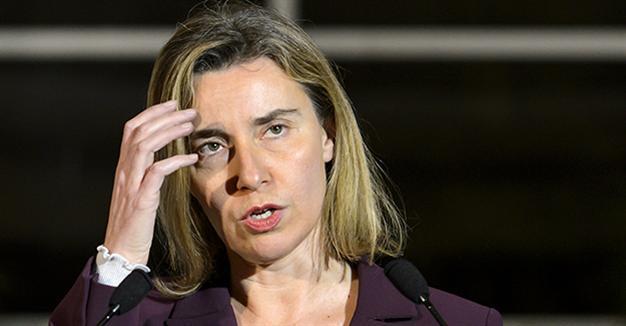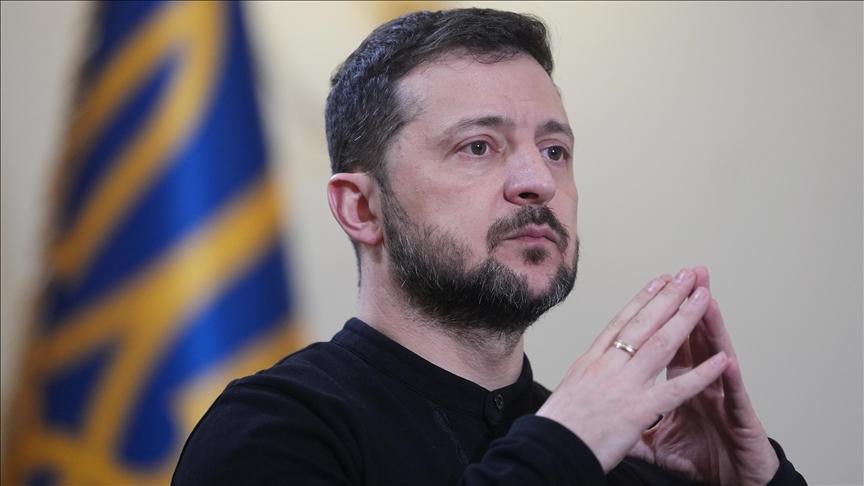EU 'concerned’ about Assad’s new offensive
BRUSSELS

EU Foreign Affairs head Federica Mogherini gestures during a press conference following a meeting during negotiations of peace talks on Syria to the United Nations Office in Geneva on March 23, 2016 - AFP photo
European Union foreign policy chief Federica Mogherini has expressed her concern about reports of “new Syrian regime offensives near Aleppo and east of Damascus.”“The EU strongly supports the U.N. efforts to resume Syrian talks and push for the political transition for the sake of Syrians, the region and the world,” Mogherini said in a statement.
In Geneva, U.N. envoy Staffan de Mistura criticized al-Assad’s government for hindering efforts to deliver life-saving assistance to Syrians in need.
The United States and Russia co-chair the International Syria Support Group (ISSG), which is seeking to achieve a peaceful settlement of the Syrian crisis.
The U.S. is also “very concerned” about reports of a Russian-backed Syrian government offensive near the country’s second city Aleppo, a senior administration official in Washington told AFP on April 14.
“Such actions could well violate the cessation of hostilities,” the official said.
The truce has held for nearly seven weeks but has been under increasing pressure in recent weeks, the official said, reiterating a call for Russia to “cease any provocative actions in Syria.”
Syrian government fighters, rebels and jihadists are battling for control of swathes of Aleppo province.
Regime loyalists backed by Russia’s air power pressed a fierce offensive just north of Aleppo, said the Syrian Observatory for Human Rights, straining the landmark cease-fire and a nascent round of peace talks in Geneva.
U.S. officials “expressed our strong concerns” to all members of the 17-nation ISSG, including Moscow, the Washington official said, urging the Kremlin to lean on al-Assad to commit to talks about a political transition.
“Now is the time for all sides to follow through on their commitment to the cessation of hostilities and to refrain from any further destabilizing actions,” the official added.
Syria’s army backed by Russian warplanes launched an assault north of Aleppo on April 14.
Outlining its bargaining position, the opposition High Negotiating Council (HNC) told Reuters it would be willing to share equally in a transitional council with the government, but repeated its rejection of a role for al-Assad.
The Syrian government, buoyed by Russian and Iranian military support, has ruled out any discussion of the presidency. Moscow and Tehran have also rejected what they see as Western efforts to predetermine al-Assad’s future.
The warring sides have sought to portray the fighting as the fault of the other, pushing toward breaking point a cease-fire that was designed to improve the political climate ahead of the Geneva talks.
In addition to the Aleppo assault, heavy government air strikes were reported north of Homs, where a doctor described the most intense government bombardment since the cessation of hostilities agreement took effect.
In Aleppo, government forces and their allies were focused on the area around Handarat Camp, overlooking an important access point held by rebels into the city, which is split into zones held by the government and opposition.
Speaking in Moscow, Russian President Vladimir Putin accused the rebels of breaching the truce to reconquer lost ground. “The opposition is trying to recover what they lost,” he said.
Putin, who last month decided to withdraw some of the Russian forces deployed to Syria, said Moscow had left Damascus in a position to launch major offensives.
















